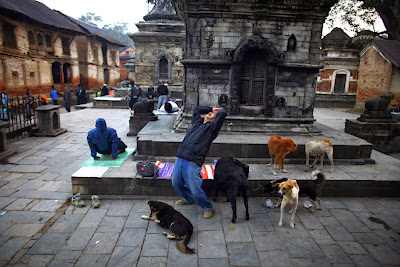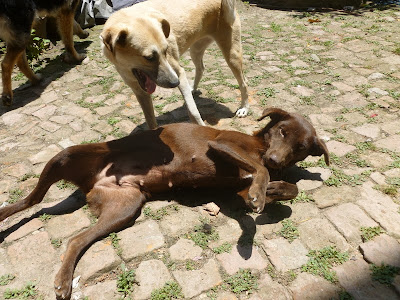If you were a dog and it was your festival day, wouldn't you start it by having a nice roll in a big steaming pile of fetid food rot and composted poo mush and unidentified green stench? If my dog had a Facebook page, her status update would say, "I stink!"
It would also say, "Happy Kukur Tihar, all my dog friends. Weren't you impressed today with how nicely I stank? Is there a better way to celebrate a day on which we, the dogs of Nepal, are worshiped for our essential dogginess?"
Kathmandu is full of dogs. In addition to households dogs, there are an estimated 20,000 dogs living on the street. Those aren't strays, which implies they strayed from somewhere. They're born and live on the street, though many do adopt a house (or a meat shop or a temple where people offer food to the gods) and hang out around it, patrolling it and hopefully getting tossed scraps for their trouble.
Our dog Sandy began life as one of them. She was born on the streets and followed our son home in iconic fashion as a small pup, about three weeks after we'd moved to Nepal. Actually he'd gone out to do "homeschool Animal Science research" (translation: feed a pack of dogs), and discovered in his research that if you feed dogs, they'll all follow you home in a wagging shoving mob. Sandy, always adventurous, was first to venture through the gate. She's a classic Indian Pariah Dog, a dingo-like critter with a curly tail, barrel chest and a vocal range that sounds like singing. The local dogs of South Asia are landrace or "primitive dogs," which means they're not formal breeds but self-selected survivors of the earliest types of dogs, much as you might have seen in Pompeii or Ancient Egypt.
 |
| This guy is either doing his morning exercise or yawning after a sleepness night filled with dog barking |
The status of dogs in Nepal can sometimes be quite sad. That's true for owned dogs as well as street dogs, sometimes more so, because at least street dogs are free while owned dogs are often chained all day. Below is a street dog (though I've seen owned dogs that skinny), now cared for at Animal Nepal, an animal welfare non-profit where my son volunteers. Further north, good work is done by KAT Centre (Kathmandu Animal Treatment Centre).
But every year the dogs of Nepal are king and queen for a day, when well-loved companions and chained guard dogs and street dogs alike are feted with food, garlands and prayer. I'm sure there are various explanations out there in WebLand, but what people really say when you ask "why do you worship dogs?" is pretty simple: They're the best friends of people. It's often said that dogs become people in their next lives. So you can think of them as Almost People.
In conversation, people tend to connect the dog festival to a beautiful story about the great warrior Yudhisthira, who after his victory in the epic Trojan War-like battles of the Mahabharata made the arduous journey over the Himalayas to the home of the gods, accompanied by his dog and his brothers. During the journey, his brothers proved to be good guys but not that good, and Hindus come down on the Works side of the Faith vs. Works debate, so the good-but-flawed brothers died along the way, like this:

When Yudhisthira finally got to heaven, only he and his dog were left. They were met at the gates by Indra, the god of rain and thunder. "What do you mean, coming to our home with this dog? You can't enter heaven unless you give up your darned dog."
"No," said the brave Yudhisthira, "my dog has been loyal to me, so I have to be loyal to him. I guess I'll go ... wherever I go if I don't get into heaven. Back for another round on the wheel."
And then Indra revealed that it had all been a test, and he had passed. The dog, in fact, was actually Yudhisthira's own father, Dharma, who had been with him all along.
Notice the curly tail on Yudhisthira's dog (a.k.a Dad in Disguise.) Curled tails are such a common feature on South Asian dogs that the letter ढ (dha) is memorized in school with the chant "kukur puchhure dha," or "dog-tailed dha," because it curls like a dog's tail.
Back to Almost Heaven, Kathmandu, where the dogs have been having their festival. If you live here, you're probably thinking, "What, don't they have a festival every day? What else could all that barking be?" Because the sound of Kathmandu at night goes like this:
silence ... somebody hawking and spitting on the street ... BARK? BARK! BARK BARK yip yip WHOOF ME TOO BARK ME TOO ME TOO .......... silence ......... silence ............. BARK? BARK. BARK! bark bark BARK BARK BARK BARK BARK!
The 20,000 voices of Dogmandu. If you come to Nepal, it helps to either appreciate dogs in harmony or have a quick exit plan.
I'm in the Appreciating camp. One of the coolest aspects of daily life here is the chance to observe dogs in a more natural setting than the First World, where they're Well-Bred and Properly Regulated and stay inside glued to their TVs and don't get to roam and interact freely, so that even observers like Alexandra Horowitz, the author of the fascinating Inside of a Dog: What Dogs See, Smell and Know, have to draw conclusions about dog-to-dog interactions by going to a dog park. That's like trying to figure out people by observing them at cocktail parties with their bosses present.
On my daily walks with Sandy, I've learned the territories of the local dogs, can see how they form alliances, and watch the interplay of personality and status. Sandy is an amiable type, always game for fun; after all, she was first through the gate as a pup (which worked out well for her personally, though not so much from a perpetuation-of-the-genes standpoint, since she got "fixed.") She seems to be a "leader" without being alpha; perhaps dogs, like people, can be taken as leaders in part because they're just nice and fun. Sandy tends to run at the head of a pack with other dogs following, but she's also very quick to roll on her back and show her belly. So leadership isn't all about toughness.
This is how she spent her Annual Day to be Worshiped. The day began as always, by meeting up in our yard with her BFF Khoire, the dog-that-adopted-our-landlady's-house. Her name means "brownie" or "mangy," depending on pronunciation. She's blind in one eye, and it took her about three months to come close to me, and even longer to warm up to Sandy. They had a big fight and Sandy still has a scar from it and now they love each other. Also Khoire is now addicted to belly rubs.
Then off to the wall across the lane to meet Saibo. He has another name, too: Chocolate-y. When "Saibo" doesn't work to call him, they resort to "Chocolate-y." Nepali dogs are great at climbing walls. This is Saibo a.k.a. Chocolate-y on his wall, displaying the classic Pariah Dog pointy ears and, of course, a lovely malla (flower garland) and tika (vermilion powder) because he has already been worshiped. Even his paws are powdered.
Then off to the wall across the lane to meet Saibo. He has another name, too: Chocolate-y. When "Saibo" doesn't work to call him, they resort to "Chocolate-y." Nepali dogs are great at climbing walls. This is Saibo a.k.a. Chocolate-y on his wall, displaying the classic Pariah Dog pointy ears and, of course, a lovely malla (flower garland) and tika (vermilion powder) because he has already been worshiped. Even his paws are powdered.
Hey Khoire and Saibo. Come on down and play. Oh I love you guys, you are my very best friends!
Harumph. I'm here too. Behind the wall. I act like I live here in Saibo's nice yard, but actually I'm just a big macho bruiser and go where I please. And where I please is Saibo's yard. He isn't as big as me, so he doesn't disagree. And somebody worshiped me today, too, because they'd better. I've got an agreement with Saibo -- you don't kick me out, I don't beat you up, and also I won't tell other dogs you're called "Chocolate-y" -- and I'm OK with dames like Sandy, although somehow she never comes into heat. What's up with that? That Valuable German Shepherd at Sandy's house came into heat and the owners locked her in a cage but I GOT IN and they found me in the cage with her in the morning, bwahaha. So the gals are OK. And Saibo, because he knows his place. Which is mine now. But I HATE Sisumanu from down the lane. Do not come into my turf, Sisumanu.
Here comes Sisumanu, to play with Sandy and Khoire. Better watch out for Nameless Bruiser.
Hmmm. This looks like a nice place. Lots of trash around.
Hey, I've got a great idea. This is WAY more fun than something Nameless Bruiser would come up with. Let's make a mad dash for the other side of the field here ...
... and roll in a STINKY COMPOST HEAP that makes us smell like fetid puke!
Of which I have no pictures. Because I was too busy blocking my nose. A stinky dog covered with green slime is all the more exciting on a day when there is no water in the house, because it's Kathmandu and there is often no water, so it was shampoo + a single bucket of water dribbles + many non-worshipful comments.
So my advice to dogs is this: Watch out for that whole plan about becoming a human in your next life. You might get your wish. And then, someday, you'll be cleaning rot-scented green slime off a dog when there's no water. See how you like it.I'm sorry. Was I bad? Yet somehow I still got my Worshipful Garland and Worshipful Vermilion Powder to show what a Worshipful Dog I am. The very embodiment of love, loyalty and joy. Including joy in stinkiness. Can I go out with my friends again? This shampoo smells kind of weird and I know just how to fix it.
Happy Kukur Tihar!











3 comments:
Wait, Nameless Bruiser does not have a curled tail?!
You write such entertaining posts. This one was no exception. I'm sort of imagining that Karel Čapek would have written something similar on the occasion... in Czech, of course; but it's got that same lighthearted yet deeply observant quality to it. :-)
Thanks! Hmmm, I couldn't read anything in Czech. But my mom is Polish, and once mistook people speaking Czech for people speaking really bad Polish ... so she might be able to understand it. Although she might be inclined to critique the grammar, since it would be such bad Polish :-)
:-)
Many of his books were translated into English, actually.
Post a Comment